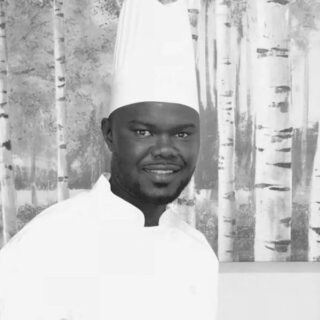
Oumar Diouf

Chef Oumar Diouf was born in Senegal. He got his start cooking at age 13, when his father passed away. He helped his mother out in the kitchen until he went to college. After college, he headed to Argentina to pursue a career in soccer. When an injury sidelined his career, Diouf decided to attend culinary school. He went on to own restaurants in Argentina — his first was selling pizza and empanadas — then moved to Brazil, where he worked in hotels and catering businesses. In his journey after culinary school, Oumar has worked with and led many different teams in several restaurants in Argentina, Brazil, and the United States ranging from casual dining to luxury fine dining.
During the 2016 Olympic Games in Rio de Janeiro, Oumar proudly led a kitchen team in charge of cooking for five Houses: the NBA House, Australian Olympic Center, New Balance’s House, Casa Cartan and Casa Time Brazil. The daily number of guests to serve exceeded five thousand people.
During his time in Brazil, Oumar was struck by the similarities between Brazilian cuisine and the food he ate growing up. “In Bahia, which is the north of Brazil … about 80 percent of their food was actually brought by slaves 500 years ago,” Oumar said. “So those cooking style techniques, even the names are very close from Africa — especially West Africa.”
Those similarities, along with an Anthony Bourdain episode about the Bahia region, inspired Oumar to pursue an Afro-Brazilian style of cooking. In 2016, Oumar moved to the Bay Area, and started a catering company called Afro-Brazilian Cuisine (ABC). In addition to ABC, Oumar also owns and cooks at the Damel, an Afro-Brazilian restaurant in Oakland. The name Damel was the title given to the king of Wolof Kingdom of Cayor which was located in modern day Dakar, the capital of Senegal.
At The Damel, Oumar set out to tell his story through cuisine, the menu reflecting his lived experience in Senegal, Argentina, and Brazil. Above all, Oumar’s goal is to demonstrate the influence of African cuisine — not just in Brazil, but all over the world.
“A lot of dance has African background, a lot of fashion has African background, but food, too, has an African background,” Oumar said. “And that’s what I want to stand for — to try to take back what’s from us and have people that want to find more about their ancestors … eating the same food their ancestors brought from Africa to here.” Oumar uses the best local ingredients to create a fusion between traditional culinary and global cooking.
